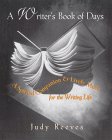Guidelines for Writing Practice
- Keep writing. Don't stop to edit, to rephrase, to think. Don't go back to read what you've written until you've finished.
- Trust your pen. Go with the first image that appears.
- Don't judge your writing. Don't compare, analyze, criticize.
- Let your writing find its own form. Allow it to organically take shape into a story, an essay, a poem, dialogue, an incomplete meander.
- Don't worry about the rules. Don't worry about grammar, syntax, punctuation, or sentence structure.
- Let go of expectations. Let your writing surprise you.
- Kiss your frogs. Remember, this is just practice. Not every session will be magic. The point is to just suit up and show up at the page, no matter what.
- Tell the truth. Be willing to go to the scary places that make your hand tremble and your handwriting get a little out of control. Be willing to tell your secrets.
- Write accurate details. Your writing doesn't have to be factual, but the specificity of the details brings it alive. The truth isn't in the facts; it's in the details.
- Write what matters. If you don't care about what you are writing, neither will your readers. Be a passionate writer.
- Read your writing aloud after you've completed your practice session. You'll find out what you've written, what you care about, when you're writing the truth, and when the writing is "working".
- Date your page and write the topic at the top. This will keep you grounded in the present and help you reference pieces that you might want to use in something else.

